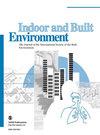使用风机盘管和热水管的净零能耗温室的能源-经济-环境分析:实验和建模
IF 2.9
3区 工程技术
Q2 CONSTRUCTION & BUILDING TECHNOLOGY
引用次数: 0
摘要
本研究分析了热水管(HWP)和风机盘管机组(FCU)在控制净零能耗温室(NZEG)小气候条件方面的性能。对之前开发的净零能耗温室 TraNsient SYstem Simulation (TRNSYS) 模型的性能进行了改进,增加了作物模型和若干 HWP 排放标准,并使用改进后的 TRNSYS 模型分析了大韩民国不同规模温室的供暖、通风和空调系统。此外,还进行了经济分析。模型验证结果表明,测量值与模拟值非常吻合,Nash-Sutcliffe 效率为 0.98。模拟模型中作物的存在使总加热负荷减少了 14.5 兆瓦时,冷却负荷增加了 4 兆瓦时。随着室外温度从夏季的 33.4[计算公式:见正文]升至 36.4[计算公式:见正文],FCU 的容量也随之增加,而随着室外温度从冬季的-21.7[计算公式:见正文]升至-12.2[计算公式:见正文],HWP 的直径也从 25A 降至 10A,从而使温室保持在 15[计算公式:见正文]的理想温度。值得注意的是,如果将每年节省的加热能源成本和碳交易收入作为净经济现金流的一部分,投资回收期将缩短 9 年。本文章由计算机程序翻译,如有差异,请以英文原文为准。
Energy-economic-environmental analysis of a net-zero energy greenhouse with fan-coil units and hot-water pipes: Experiment and modelling
This study analysed the performance of a hot-water pipe (HWP) and fan-coil units (FCUs) in controlling microclimate conditions in a net-zero energy greenhouse (NZEG). The performance of a previously developed TraNsient SYstem Simulation (TRNSYS) model for the NZEG was enhanced to include a crop model and several HWP emission standards, and the improved TRNSYS model was used to analyse heating, ventilation and air-conditioning (HVAC) systems for different greenhouse sizes in the Republic of Korea. Further, an economic analysis was conducted. The model validation showed excellent agreement between the measured and simulated values, with Nash-Sutcliffe efficiency of 0.98. The presence of crop in the simulation model reduced the total heating load by 14.5 MWh and increased the cooling load by 4 MWh. The capacity of the FCU was increased as the outside temperature rose from 33.4[Formula: see text] to 36.4[Formula: see text] in summer, and the diameter of the HWP was decreased from 25A to 10A as the outside temperature rose from −21.7[Formula: see text] to −12.2[Formula: see text] in winter to maintain the greenhouse at the desired temperature of 15[Formula: see text]. Notably, the payback period was reduced by 9 years when the annual savings in heating energy costs and revenue from carbon trading were considered as a part of the net economic cash flow.
求助全文
通过发布文献求助,成功后即可免费获取论文全文。
去求助
来源期刊

Indoor and Built Environment
环境科学-工程:环境
CiteScore
6.40
自引率
25.00%
发文量
130
审稿时长
2.6 months
期刊介绍:
Indoor and Built Environment publishes reports on any topic pertaining to the quality of the indoor and built environment, and how these might effect the health, performance, efficiency and comfort of persons living or working there. Topics range from urban infrastructure, design of buildings, and materials used to laboratory studies including building airflow simulations and health effects. This journal is a member of the Committee on Publication Ethics (COPE).
 求助内容:
求助内容: 应助结果提醒方式:
应助结果提醒方式:


